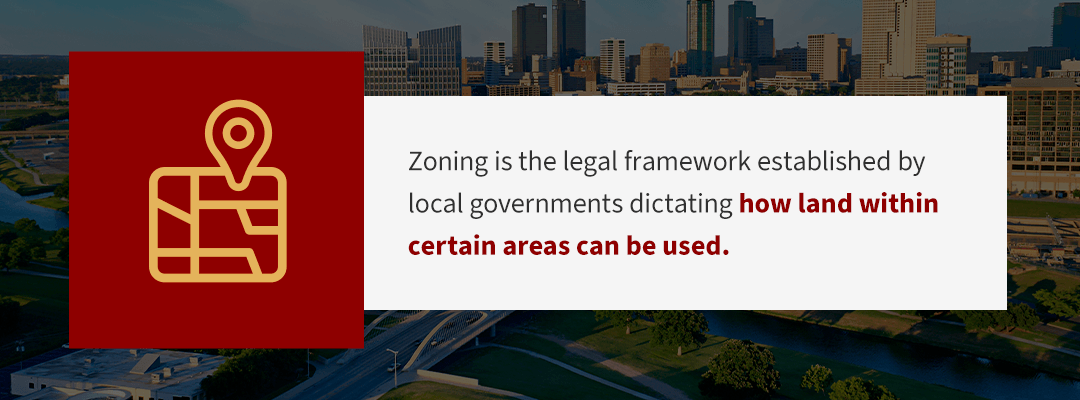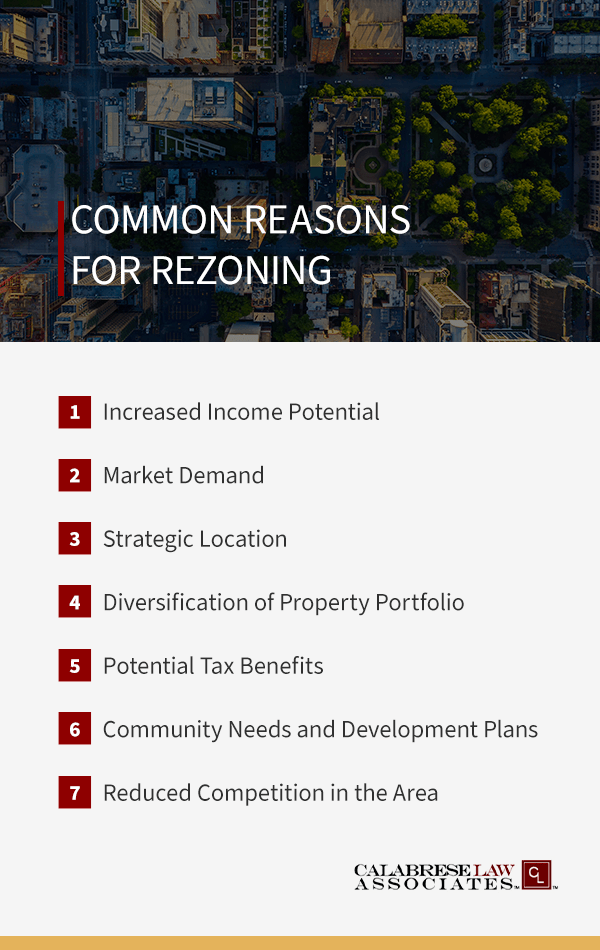Do you own a residential property and wonder whether you can convert it into a commercial one? Local zoning laws can be complex, so we have prepared this guide to help you find the answers you need. We discuss the meaning of zoning, the different classifications, common reasons for rezoning, and the process involved.
Calabrese Law Associates has a team of real estate and construction attorneys who help clients apply for and secure permits or approvals. We can examine your case and guide you through the process.
What Is Zoning?
Zoning is the legal framework established by local governments dictating how land within certain areas can be used. It is a critical aspect of urban planning and development, which aims to organize land use to promote orderly growth. Zoning also ensures compatibility between different types of land uses. Key components include:
- Zoning ordinance: These laws define the zoning regulations for specific areas. They outline the permitted uses, building heights, lot sizes and other criteria.
- Zoning districts: Zoning authorities divide land into various districts or categories, each with unique regulations. Common categories include residential, commercial, industrial, agricultural and mixed-use.
- Permitted uses: Each zone specifies what types of activities are allowed. For example, a commercial zone may enable the development of malls and offices and limit residential activities.
- Conditional use: Zoning authorities may allow some uses under certain conditions. These special permits allow for flexibility while maintaining control over land use.
- Variances: Property owners may request to deviate from zoning requirements under specific circumstances. This arrangement does not change the zoning laws but adjusts land use in unique situations.
Zoning has many benefits, such as:
- Community planning: Regulating land use can help shape the character of communities and ensure compatible developments.
- Property value: Promoting compatible land uses and developments can enhance property values.
- Environmental protection: Through zoning, stakeholders can protect the environment and manage the impacts of human activities.
- Public health and safety: Zoning laws often address noise control, traffic flow and public safety issues.
Learning the basics of zoning can help you avoid inconveniences like project delays and fines.
The Different Types of Zoning Classifications
Zoning categories can vary by municipality but generally fall into several broad categories. Here are the common types of zoning found in real estate:
- Residential zoning: These are areas designated for residential activities like single-family homes and multi-family units. Multi-family units include apartment buildings and condominiums. Some residential properties also have commercial spaces, an arrangement known as mixed-use.
- Commercial zoning: This zoning category can generally be classified into neighborhood, general and highway commercial. Neighborhood covers small-scale businesses that serve local communities, like grocery stores and restaurants, while general includes larger commercial enterprises like department stores and offices. Highway involves businesses catering to highway traffic, such as gas stations and fast-food restaurants.
- Industrial zoning: There are light and heavy industrial areas. Light industrial areas generally focus on manufacturing and distribution and have minimal impact on surrounding areas, like warehouses. Heavy industrial areas are designated for more intensive industrial activities that produce noise or pollution, like factories.
- Agricultural zoning: These are areas reserved for farming and agricultural activities, such as crop and livestock production. This zoning aims to protect farmland from urban development.
- Special purpose zoning: These zones are created for unique uses or developments. For example, the area could be zoned for institutional purposes like schools or hospitals. Historic districts, like historically significant areas or structures, also fall into this category.
Understanding the different zoning classifications is vital because it influences land use decisions, property values and community development. As the specific zoning categories and regulations differ, it’s best to consult local zoning ordinances for precise information.
Can Residential Zoning Be Changed to Commercial?
Properties zoned for residential purposes can be changed to commercial in certain instances. First, the modification must comply with the zoning regulations. If the general area is zoned for mixed-use, you can likely obtain a permit and change your residential property to commercial as long as you meet the area’s requirements. For example, if the area is zoned for small-scale businesses only, like restaurants, you may not build a gas station. However, depending on the situation, you may request a variance to deviate from the permitted use.
Second, you must follow the established processes. You must obtain the necessary permit from the local zoning authority or city council and adhere to all the relevant laws when developing the property. Considering the assessment and execution could be challenging due to the legal technicalities, you should consult an experienced attorney. Lawyers can examine the zoning regulations and help you obtain the necessary authorization. They can prepare and submit all the paperwork, saving time and effort.
Common Reasons for Rezoning
There are many reasons why you may want to change your property’s use from residential to commercial. Here are seven examples:
1. Increased Income Potential
Commercial properties sometimes provide high rental income, especially in areas with high demand for commercial spaces. Property owners may decide to start their own businesses or lease the space for business, which can yield greater profits than residential leasing.
2. Market Demand
Sometimes, demand for commercial spaces in certain areas grows more than the residential ones. To capitalize on this trend, property owners may convert their residential properties into commercial use. Also, as neighborhoods evolve and attract new businesses, existing residential properties may become more valuable as commercial sites.
3. Strategic Location
Properties with high visibility and accessibility to main roads, public transportation or bustling neighborhoods sometimes present commercial opportunities. Property owners may want to convert their residential properties to commercial if the area is undergoing commercial revitalization or development.
4. Diversification of Property Portfolio
Property owners looking to diversify their investments may convert residential properties into commercial spaces. This strategy can mitigate risks associated with solely relying on residential income. Moreover, commercial properties often appreciate at different rates than residential properties, providing an opportunity for increased long-term value.
5. Potential Tax Benefits
Depending on the state or local tax laws, commercial property owners may enjoy some financial incentives or tax benefits. Property owners who want to benefit from such deductions or credits may be tempted to convert their residential facilities to commercial.
6. Community Needs and Development Plans
Owners might recognize that local government plans encourage mixed-use developments or increased commercial activity in certain areas. If there is community support for more local businesses and services, owners may feel encouraged to pursue rezoning.
7. Reduced Competition in the Area
If there are few commercial options nearby, converting a residential property can fill a gap in the market to meet local demand. Property owners may see an opportunity to provide niche services lacking in the area.
The Impact of Rezoning on Property Value
Rezoning can increase or decrease property value. Increased density and property demand can enhance competition, creating opportunities for investors. Conversely, compatibility issues and market saturation due to the oversupply of commercial spaces can impact economic growth. Therefore, conducting due diligence and financial feasibility is vital before making decisions. For instance, making projections based on data can help you determine whether the investment will benefit you long-term. Similarly, due diligence can help you mitigate associated risks, such as market volatility and regulatory drawbacks.
What Are the Commercial Zoning Laws?
Zoning in Massachusetts is governed by legislation and case law. Legislation is the law made by the legislature or any other agency with the authority of the legislature. For example, under Chapter 40A of the Massachusetts General Laws, the legislature has authorized towns and cities within the state to adopt ordinances and bylaws to regulate the use of land, structures and buildings.
The law also makes provisions for special permits or variances. Cities and towns can also plan jointly with other cities and towns to promote prosperity and development within their area. Thus, to know which law applies to your jurisdiction, you must review the relevant local regulations.
Case law is based on past judicial decisions and can influence future outcomes. They can elaborate on the local zoning laws and guide you in interpreting or applying those laws. Zoning laws are comprehensive and complex, but lawyers are trained to learn and use them in resolving legal issues. If your issue ends up in court, judges will likely consider the existing case law applicable to your case when making decisions.
Steps for Changing Zoning from Residential to Commercial
Changing your property’s use from residential to commercial involves several steps. Here is a guide to help:
1. Initial Research and Documentation
Research the local zoning ordinance to ascertain whether commercial buildings are permitted there. Also, check the kind of commercial buildings permitted to know if your plan fits in. If not, you may have to apply for a special permit or variance. Remember to collect the necessary documents, such as renovation plans, and keep records of correspondence.
2. Public Hearings and Community Feedback
You may want to attend zoning board meetings to identify decision-makers and possible issues you may have overlooked. You can also present your plans, learn about the community’s plans, and obtain helpful feedback. The insight you gain can influence your decisions as you engage directly with the stakeholders.
3. Submitting an Application for Rezoning
Attach all relevant documents and apply at the city council or local zoning authority. For instance, you may need to submit a site plan and commercial real estate proposal highlighting the changes you want to make. If the conversion requires structural modifications, you may need to obtain permits. The same applies when the intended purpose requires further approval, such as environmental protection or health department permits. Note that there are additional laws regarding construction and business licenses or registration once the project is complete.
The Average Timeline for Rezoning Processes
The duration it takes to get approval varies on a case-by-case basis. Common factors that impact the timeline include:
- Existing local plans: You will likely get approval faster when your proposal aligns with the municipality’s plan.
- Errors in the application process: Submitting clean applications with all relevant attachments can lead to faster approvals.
- The complexity of the project: Simple projects that do not demand significant zoning modifications often get approvals more quickly.
- Economic considerations: Executing projects while meeting all financial obligations can reduce delays.
Prepare adequately before applying to convert your property. You want to eliminate unnecessary obstacles that can hamper progress.
Environmental Considerations When Changing Zoning From Residential to Commercial
Changing a property’s use from residential to commercial can impact the environment. When conducted improperly, construction activities can cause pollution and interfere with the ecosystem. Before starting, it could be beneficial to perform an environmental impact assessment and comply with local, state and federal laws like the Clean Water Act (CWA) and the National Environmental Policy Act (NEPA). Additionally, you will want to comply with the green building standards and building energy codes where applicable.
Besides ensuring compliance, environmentally friendly developments can save costs and increase the property’s value. Demonstrating a commitment to sustainability can also build a strong brand for your business.
Working With Zoning Consultants and Legal Professionals
Zoning consultants and legal professionals provide invaluable services, such as:
- Legal professionals: Real estate and construction attorneys can review zoning laws, advise you, and help you apply to convert your property from residential to commercial. They can represent you in hearings and meetings where necessary.
- Surveyors: These professionals conduct surveys to establish property boundaries. They can also prepare site plans detailing existing conditions and proposed developments, often required by zoning applications.
- Environmental consultants: These professionals conduct studies to evaluate the potential environmental impacts of your proposed development. They can also recommend mitigation strategies and ensure compliance with environmental regulations.
Collaborating with an effective team can significantly enhance your success in the rezoning application process and help you stay compliant.
Why Trust Us?
Calabrese Law Associates helps individuals and businesses comply with the Massachusetts zoning laws. We have an impressive team with years of combined experience in the industry. Our dedicated, well-trained lawyers have handled many complex cases and possess the resources to help you achieve your goals. We implement practical strategies by assessing each case’s merits and developing personalized solutions.
Calabrese Law Associates prioritizes legal excellence and is committed to providing world-class services. We take a proactive approach to solving legal issues. Most importantly, we treat clients like family, as we believe good relationships breed success. Our lawyers listen attentively and are responsive to the needs of those we serve.
The secret to our continued growth is honesty. We abide by ethical rules and communicate openly, which has enabled us to build strong bonds and obtain positive reviews.
Get Help With Your Residential to Commercial Zoning Needs
Converting your property from residential to commercial requires you to comply with local zoning regulations. While complex, working with a recognized law firm can help streamline the process. As an award-winning firm with knowledge of the laws, Calabrese Law Associates could be your ideal partner.
With years of experience in property development and land use, we can examine your matter and help you apply for rezoning. We can also provide legal representation where the need arises. We serve individuals and businesses in the Greater Boston Area and throughout Massachusetts. If you need legal assistance, contact us today!
This publication and its contents are not to be construed as legal advice nor a recommendation to you as to how to proceed. Please consult with a local licensed attorney directly before taking any action that could have legal consequences. This publication and its content do not create an attorney-client relationship and are being provided for general informational purposes only.
Attorney Advertising. Prior results do not guarantee a similar outcome.







